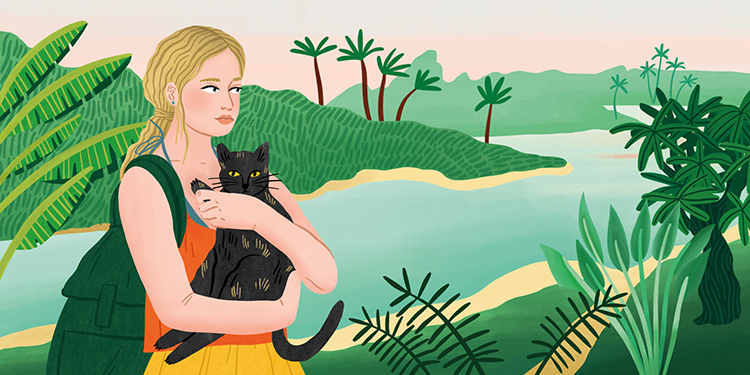It’s 7:30 in the morning and I’m walking 40 minutes downhill to the closest bus stop on the Panamerican Highway, a 19,000-mile route that officially links Monterrey, Mexico, to Valparaiso, Chile. On my little stretch in rural Ecuador, it’s a basic two-lane road with potholes, pavement wearing thin, and deep drainage channels on both sides.
From my house, which stands at an altitude of 10,500 feet, la panamericana cuts switchbacks 500 feet down into the river valley, through farm fields and groves of evergreen trees, before curving circuitously back up to the high school where I work. I’m almost at the traffic control booth that marks the edge of the canton (town) and my bus stop, when a tiny black kitten walks up to me and fiercely demands to be picked up.
I live in Andean Ecuador — a 9-hour bus ride south of the capital city of Quito — where I’m a Peace Corps volunteer (PCV) in the Teaching English as a Foreign Language program. Due to the way the Earth bulges at the equator, I may be the closest PCV to the sun, but most of the time, it’s chilly and damp like my hometown of Seattle — not good weather for the survival of stray kittens. I’m the lone white woman living and working in my communities, which has earned me the affectionate nickname “la gringita,” little foreigner.
The Peace Corps has three goals: to help interested countries train workers; to promote a better understanding of the United States among host country nationals; and to promote a better understanding of host countries within the United States, all with the overarching ideal of building world peace. I work with high school teachers on English and teaching methods for about 30 hours per week, dividing the rest of my time between starting a leadership club for the students, hunting down reading materials for the empty English section of my school library, and rescuing stray kittens.
Keats, as I eventually named him, was a very dignified 5-week-old with tufts of white fur and yellow eyes. When I couldn’t find anyone to claim him, after going door-to-door with fumbled questions in Spanish, I took the bus home, where I made him kitten formula and worked remotely.
Keats was on my lap the day the Colgate Bookstore confirmed they could collect the books they can’t sell (advance readers’ copies and editors’ proofs) if I could find the funds to ship them to Ecuador. He was purring on my shoulder when the Colgate Pen Pals’ Club wrote back to me about connecting my leadership club members with college students in the United States. As I write this essay, he’s running around my apartment with the neighbors’ black puppy, his new friend. I have 12 months of grant writing, lesson planning, in-service training, and mentorship to go, and my Ecuadorian good-luck charm will be with me every step of the way.
After all, if the number 13 can be lucky for Colgate, why can’t a black cat be lucky, too?
Lee Tremblay ’16 was an English and social sciences double major who has been working in the social sector since graduation. In her free time, she goes to martial arts classes, dances, and writes for literary magazines.

